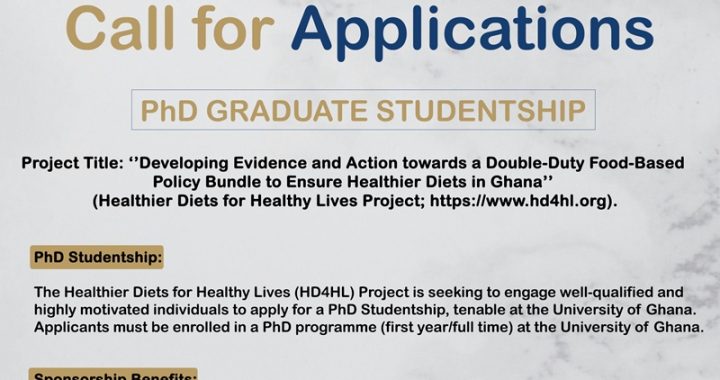The Ministry of Health and its partners have launched a “double-duty policy bundle initiative” to assure healthier diets and reduce the double burden of malnutrition in Ghana
Despite the prevalence of infectious diseases, undernutrition, and micronutrient deficiencies, non-communicable diseases (NCDs) are expected to become the primary cause of mortality in Africa by 2030.
Suboptimal diets are key contributors to increasing the risk of these diseases and thereby affect the health and economic systems of a nation. Population diets are influenced by food environments.
Unhealthy food environments stymie efforts in overcoming this double burden of malnutrition (coexistence of undernutrition along with overweight and obesity or diet-related NCDs).
The government of Ghana following the United Nations Food System Dialogues and the Historic Summit held in September 2021, made solemn commitments to improving its food environment by implementing, among others, food-based dietary guidelines and a nutrient profiling system to facilitate the implementation of a set of food-based policy bundle for Ghana.

Dr. Emmanuel Odame Ankrah – Health Policy, Planning and Management Director, MOH
Food environments are conceptualized as the physical (food availability, quality, marketing), economic (food prices), policy (rules and food policies) and sociocultural (norms and beliefs) surroundings, opportunities and conditions that influence people’s food choices and nutritional status.
Currently, in Ghana, food environments do not always ensure that the healthy food option is the easiest or default option. Government policies have the potential to support the promotion of healthy diets, empower populations to make healthier choices and reduce levels of overweight, obesity and NCDs by creating supportive food environments.
If Governments enact comprehensive policy measures that limit the availability of unhealthy foods (e.g., energy-dense nutrient-poor foods, foods that contain too much salt/sugar/saturated fats) in public institutions and markets, adjust the relative price of foods to equitably promote health and economic value, and ensure that food products have bold and truthful information for all consumers; the production, processing and promotion of unhealthy foods will be reduced; leading to increased availability, attractiveness and consumption of healthy foods (e.g., unprocessed/minimally processed foods including whole grains, fruits and vegetables).
It is through this national commitment, the increasing evidence for, and the recognition of the effectiveness of a set of policies that change consumer food environments and enable more nutritious diets, that a coalition of government agencies.
The innitiative is led by the Ministry of Health, Food and Drugs Authority, National Development Planning Commission), Academia (led by the University of Ghana School of Public Health) and Civil Society (led by the Coalition of Actors for Public Health Advocacy) is co-implementing the project code name: Healthier Diets 4 Healthy Lives Project (HD4HL) in Ghana.
The Project titled, ‘Developing evidence and action toward a double-duty food-based policy bundle to assure healthier diets in Ghana’ was launched on Wednesday, the 9th of March, 2022.
The aim of the project is to build evidence and mobilize multi-stakeholder actions toward a policy bundle for healthier and more equitable consumer food environments that reduce the double burden of malnutrition in Ghana.
Launched by Ghana’s Minister of Health, Hon. Kwaku Agyeman-Manu, the event also served as the Project’s inception meeting which built consensus on the project’s focus and approaches. The meeting was sandwiched with activities including but not limited to: contextual and technical presentations; breakout sessions; and plenary discussions.
Due to COVID-19 restrictions, the meeting was held residential for about 60 stakeholders at the Mensvic Grand Hotel, East Legon, Accra, Ghana, with about 75 stakeholders joining virtually via the Zoom platform.
The HD4HL Project is made possible with financial support from The Rockefeller Foundation and the International Development Research Centre (IDRC-Canada).
Source: newswiregh.com




